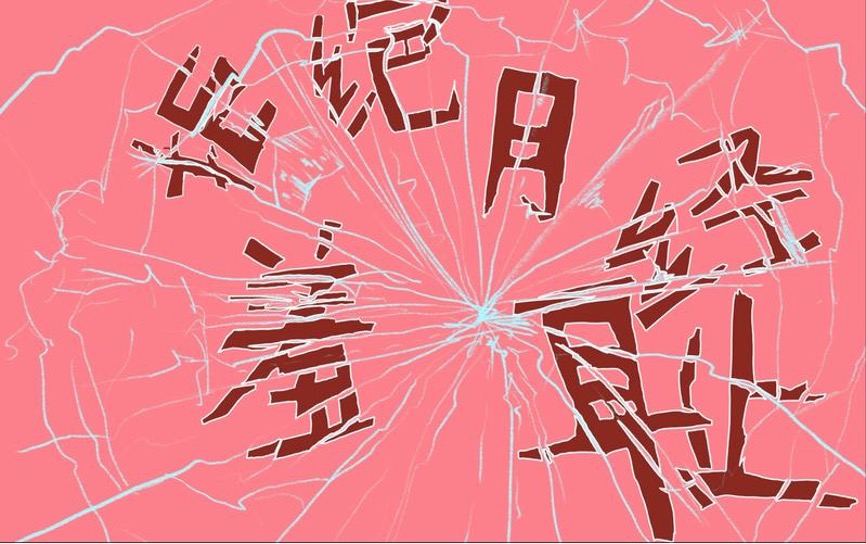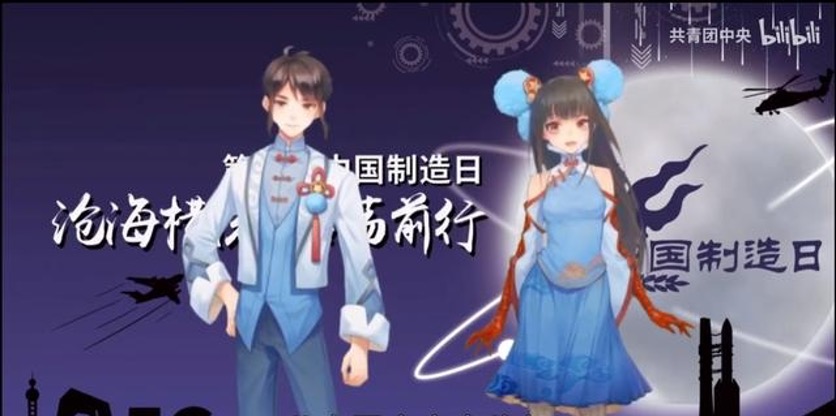#RefusingMenstrualShame (#拒绝月经羞耻): Affective Feminist Catchphrases on Chinese Social Media
This blogpost explores #RefusingMenstrualShame as a catchphrase adopted by digital feminist activists in China, aiming to challenge patriarchal taboos around menstruation whilst sparking both feminist solidarity and anti-feminist backlash.

An image calling for 'refusing menstrual shame' (credits: @颗粒Lee_e on Bilibili)
Sitian Chen is a PhD Candidate in the IOE, Faculty of Education and Society, University College London.
Introduction
Social media and the digital space have played important roles in the Fourth Wave of Feminism. Hashtag feminist activism like the #MeToo movement connects women from different places on a global scale to voice against patriarchal oppression. Feminist activism has recently gained increased popularity in China. Certainly, digital feminist politics is a complex and rich topic to research, with multiple perspectives and interpretations available. In this blog, I want to share a brief story about recent menstrual activism in China, touching a little on how affects, or emotions, can inform us of an alternative way to understand catchphrases and the Chinese context.
'Shame': The Origin
In contemporary China, openly discussing menstruation is still considered a taboo. However, this does not mean that menstruation is entirely invisible on Chinese social media before the recent menstrual activism. Menstruation has been referred to by various euphemisms in different cultural contexts. In contemporary China, metaphors such as "big aunt"("大姨妈"), "that"("那个"), "thing"("事儿") etc., are prevalent both in the virtual world and in the physical world (Wang and Ouyang, 2023). When mentioning "big aunt" on Chinese social media, discussions typically revolve around humour related to menstruation, particularly focusing on how it affects heterosexual relationships, rather than on women's rights. For example, there was a popular saying ‘Never infuriate a creature that bleeds for successive seven days’, which means men need to be careful not to infuriate their menstruating girlfriends, based on the stereotype that women are irritable when they have periods (Yang, Qiu and Zhu, 2023). Some other jokes also highlighted how menstruation frustrated men when they wanted to have sex with their girlfriends. In this sense, menstruation, as a strong feminine feature, is considered a private issue for women to tackle. It seems to be women's fault for not handling it well, even leading to condemnation and mocking. This shame towards menstruation reveals the silencing and alienating of women in a patriarchal society. Behind these popular metaphors and jokes, there is a gendered power that promotes shame and suppresses different feelings of women in the Chinese context.
'Anger': The Spread
This oppression of female bodies encountered strong resistance during COVID-19, a period when the digital world became essential for people during the lockdown. Six months after the breakout of COVID-19, an Internet influencer @梁钰stacey launched a large-scale donation of period products for frontline female medics in February 2020. Meanwhile, Chinese Central Television (CCTV) broadcasted a series of 'fighting the epidemic' stories, which included an interview with a nurse describing difficulties in managing her menstruation when she took care of patients, but this interview was deleted from its rebroadcast on 17 February 2020 (Yang, 2022). This act soon provoked numerous people to fight against this discrimination. Posts started to emerge rapidly across different social media platforms and "#Refusing Menstrual Shame" (#拒绝月经羞耻) became a key slogan. The word 'refusing' is very affective, spreading the anger towards injustices. The slogan also attempted to replace euphemisms with a more direct and formal word 'menstruation' (月经), whereas the original emotion-shame towards menstruation, was exposed and excelled by the anger. Hemmings (2012) developed a concept of affective solidarity to reexamine feminist politics of transformation. She argued that feminist politics builds solidarity by drawing on affects, such as rage, frustration and the desire for connection, that arise from challenging the unfair status quo (Hemmings, 2012; Mendes, Ringrose and Keller, 2019). In this case, activists appealed to end the shame of uttering menstruation and to guarantee access to period products, which are not only necessary for female medics but all people who menstruate. Menstruation has become a digital 'flow' with affective experiences widely shared via social media, calling for efforts to ensure women's rights.
'Fear': The Oppression

The anger of #Refusing Menstrual Shame spread in different wordings on social media as a wildfire. However, the menstrual shame not only triggered activists' anger but also evoked other affects among opponents, including the Chinese government and anti-feminists. A fear of the results of exposing menstruation emerged. As the affective solidarity of menstrual activism expanded, it also soon became a power to rebel against state patriarchy in China. On 18 February 2020, a Weibo (twitter-like platform) user posted a question for Jiangshanjiao (江山娇), "#Jiangshanjiao, do you get your period?". Jingshanjiao was a virtual female figure designed for The Chinese Communist Party Youth League (CYL) to steer public speech in a way that young people would prefer. The project of Jiangshanjiao happened to launch on the same day when the interview of a menstruating nurse, which was mentioned in the last section, was erased from CCTV, and menstrual activists drew on this figure to satirise the state's menstrual shame (Yang, 2022). This question gained more than 800,000 likes within a couple of hours and promoted more sarcasm about sexism. However, these discussions were censored and silenced on social media by the state within 12 hours. Instead of replying to these interrogations, the Chinese Communist Party (CCP) decided to shut down the account of Jiangshanjiao and banned any discussion surrounding it. They feared that these activists might threaten the CCP's authority and governance, particularly since feminism is widely regarded as “a Western ideology”(Zarafonetis, 2017). The anti-feminist backlash might also stem from a fear that the patriarchy would be weakened by feminist activism. Some men as well as women accused menstrual activists of asking for privileges and denied the necessity to fulfil the rights of accessing period products (Pengpai, 2022). The changes in gender hierarchy seemed terrifying for them because it meant that those with vested interests, such as some men, would have to give up certain benefits, while those seeking rights, such as some women, would have to face significant risks. This fear of feminist challenges and anger becomes another affective power to reinforce the oppression against feminism in China.
Conclusion and Reflections
As Xumeng stated in the post, catchphrases on social media are more than texts, they wove with complex feelings. In this blog, I recapped the recent menstrual activism in China. This activism brought up a prevailing slogan- "#Refusing Menstrual Shame" through affective solidarity. More related slogans, such as "#Jiangshanjiao, do you get your period" and "#SELLING PERIOD PRODUCT ON TRAIN," emerged from this feminist anger towards patriarchal oppression. However, it also triggered counter-emotions from opponents, such as fear, which simultaneously reinforced the oppression. From observing this conflict of different affects, combats of gender power, political power, linguistic power etc. in the Chinese context can also be explored. Affects thus can be useful for elaborating the complex practices of political activism, especially grassroots activism like feminist activism (Mendes, Ringrose and Keller, 2019).
Although this blog mainly discusses how the affects of the catchphrase #Refusing Menstrual Shame spread in the digital world, it does not mean that this slogan was only affective ‘online’. Though it originated during the COVID-19 period, its influence has persisted long after the pandemic, impacting both the digital and physical world. Local campaigns against menstrual shame, including donating period products and promoting menstrual education also become more and more popular in China. While my research focus is more on young people's lived experiences of menstruation in China, I have also noticed that digital activism about menstruation can be a significant component for young people to interpret and discuss their ‘offline’ experiences. There is no boundary between "online" and "offline" affects. By transferring shared affects, digital catchphrases can also enter the broader realm of everyday communication.
References
Hemmings, C. (2012). ‘Affective solidarity: Feminist reflexivity and political transformation’. Feminist Theory, 13 (2), pp. 147–161. doi: 10.1177/1464700112442643.
Mendes, K., Ringrose, J. and Keller, J. (2019). ‘Theoretical and Methodological Approaches to Studying Digital Feminist Activism’. in Mendes, K., Ringrose, J., and Keller, J., Digital Feminist Activism. Oxford University Press, pp. 24–41. doi: 10.1093/oso/9780190697846.003.0002.
Wang, Q. and Ouyang, H. (2023). ‘Counter-discourse production in social media: A feminist CDA of a Weibo post’. Discourse & Communication, 17 (3), pp. 319–335. doi: 10.1177/17504813221150187.
Yang, X., Qiu, H. and Zhu, R. (2023). ‘“Never infuriate a creature that bleeds for successive seven days”: (un)supportive discourses of Chinese male netizens on dysmenorrhea’. Feminist Media Studies, 23 (1), pp. 253–269. doi: 10.1080/14680777.2021.1950796.
Yang, Y. (2022). ‘When positive energy meets satirical feminist backfire: Hashtag activism during the COVID-19 outbreak in China’. Global Media and China, 7 (1), pp. 99–119. doi: 10.1177/20594364211021316.
Zarafonetis, N. (2017). Sexuality in a changing China: young women, sex and intimate relations in the reform period. London ; New York: Routledge, Taylor & Francis Group (Routledge research on gender in Asia series).
澎湃新闻 (2022) 听说高铁上要卖卫生巾,他们急了. https://m.thepaper.cn/newsDetail_forward_19968288 (Accessed: June 28, 2024).